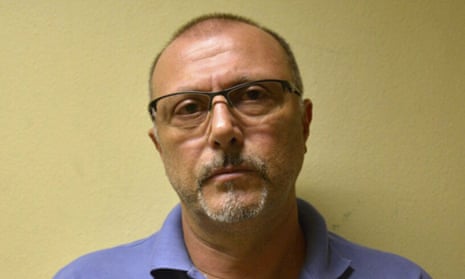After 31 years on the run, one of Italy’s most feared mafiosos has been arrested on a quiet street in north-eastern Brazil.
Pasquale Scotti, a leader of the Camorra syndicate who is wanted for more than two dozen murders, was detained by police while taking his children to school in Recife.
Police believe his Brazilian family were unaware of his identity, which was exposed by Interpol through fingerprint examination.
He had been living under the false name Francisco de Castro Visconti. Reinventing himself as a businessman, he had local identity papers, registered as a voter and partly owned a nightclub and food import business.
Photographs of the 56-year-old suspect in handcuffs show a man very different from the figure seen on Italian wanted posters. The gangster in his twenties with thick hair and dark bushy brows is now a balding middle-aged man with a beard, glasses and a slight paunch.
Scotti is said to have arrived in Brazil in 1986, a couple years after being placed on Italy’s most wanted list. The following year he moved to Recife, a city of 1.5 million people on the north-east coast that is far less in the international spotlight than São Paulo or Rio de Janeiro.
In 1995, he married a Brazilian woman with whom he has two children. They live in the city’s Sancho district.
“He told us in a statement that his family was not aware of anything,” said Giovani Santoro, the communications officer of the Pernambuco federal police force.
The arrest by four officers was carried out with the minimum of fuss. “He was approached in the morning when he left home and the arrest was communicated. The officers allowed him to take his kids to school first, followed him, and then arrested him. There was no resistance, it was very discreet,” he said.
Police said he had no reason to believe the detainee was involved in criminal activity in Brazil. “He has a clean slate here,” a spokesman said.
But Italian law enforcement officials will now begin extradition proceedings against a man who has been one of their country’s most wanted since 1984.
The alleged crime boss is accused of extortion, firearm offences and murder. In January 2005, he received a life sentence in abstentia for 26 killings.
He is believed to be very close to Raffaele Cutolo, the head of the Nuova Camorra Organizzata – the “new” Camorra – who is serving multiple life sentences for murder, according to Federico Varese, a mafia expert and criminologist at Oxford University.
Scotti was involved with Cutolo in the 1980s, Varese says, but after being nabbed by Italian authorities he escaped a local Neapolitan hospital, where a relative allegedly worked. Scotti has been the subject of intense speculation, with rumours circulating for years that he was either dead or working for the ‘Ndrangheta mafia, which is based in Calabria.
Roberto Saviano, the journalist who exposed the Camorra’s crimes in his bestselling book, Gomorrah: Italy’s Other Mafia, and who has faced numerous death threats, told the Guardian in an email: “I know well the story of Scotti. We all grew up with the myth of Pasquale Scotti!”
Renato Natale, the anti-mafia mayor of Casal di Principe, which was once considered prime Camorra territory, told the Guardian: “I thought he had completely disappeared from circulation, so this news surprised me – pleasantly. Justice runs its course and in the end they catch you”
“In the early 1980s [Scotti] was a big fish, but after that, when he became a fugitive, no one heard of him anymore,” added Natale.
Scotti may have gone to Brazil because it was a country that was notoriously reluctant to approve extradition requests from Europe. In the 1980s, the UK train robber Ronnie Biggs lived openly in Rio de Janeiro despite being wanted by British police.
However, procedures have subsequently been eased so it is likely Scotti will be returned to Italy to face justice.
Additional reporting by Shanna Hanbury

Comments (…)
Sign in or create your Guardian account to join the discussion